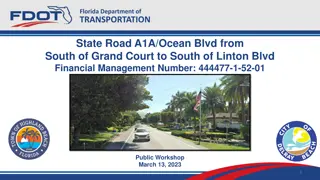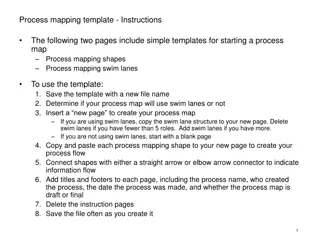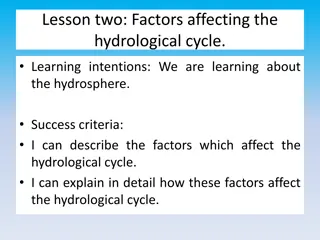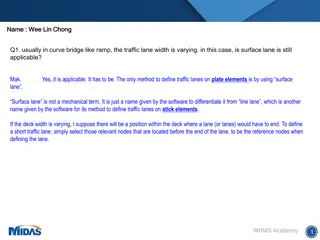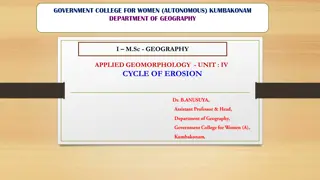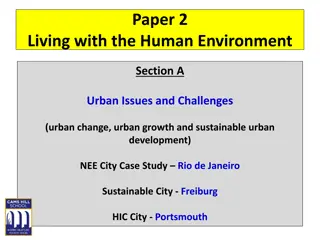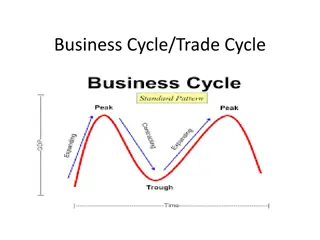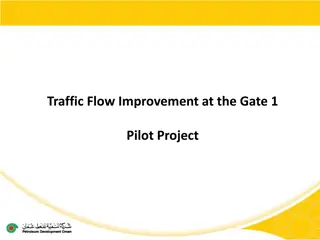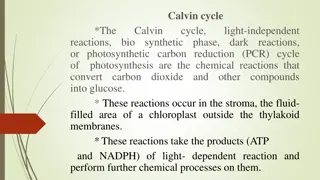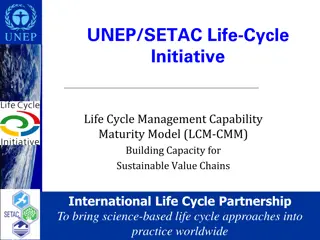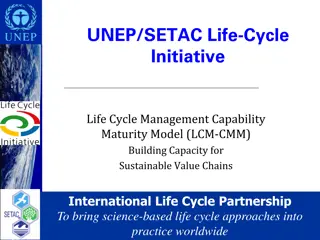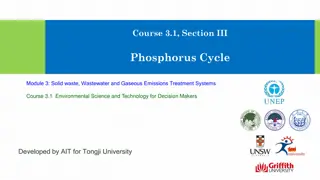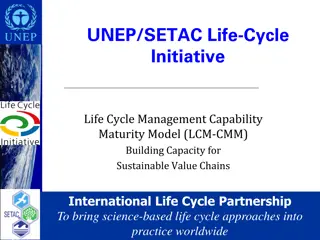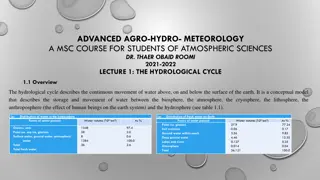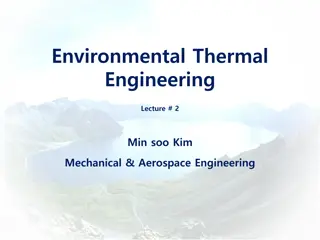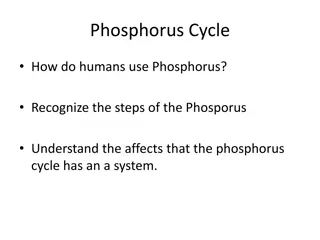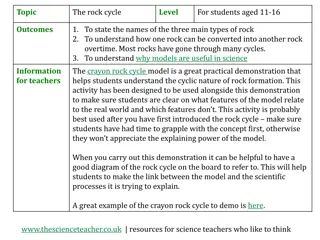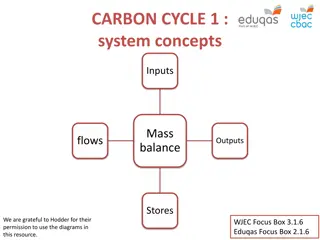YMCA of Greater Richmond Head Clerk of Course Training Guide
This training guide provides detailed information on the responsibilities of a Head Clerk of Course at YMCA of Greater Richmond, including setting up and starting meets, organizing individual events and relays, troubleshooting, and more. It covers the process of seeding swimmers in heats and lanes,
0 views • 15 slides
Florida Department of Transportation Project Overview
The Florida Department of Transportation is conducting a project on State Road A1A/Ocean Blvd from South of Grand Court to South of Linton Blvd. The project aims to resurface roadway pavement, widen shoulders for bicycles, improve drainage, upgrade signage, and extend left turn lanes. The project le
0 views • 14 slides
BUSINESS STAKEHOLDER MEETING
Main Remade is a project by the Kentucky Transportation Cabinet aimed at improving safety and accessibility on Main Street in downtown Louisville. Key features include converting one-way streets to two-way, adding protected bike lanes, and upgrading crosswalks. The project will be implemented in thr
0 views • 25 slides
Indian Restaurants Florida
Take a spin on India's rich culinary whe\u00adel right in the heart of Florida's buzzing dining are\u00adna. Indian eateries he\u00adre swirl you through the spice-sce\u00adnted lanes of the Indian subcontine\u00adnt. From Orlando's bustling lanes to Jacksonville's seaside\u00ad allure, these place\
0 views • 4 slides
Simplified Process Mapping Templates and Shapes
Comprehensive instructions and templates for initiating a process map, with clear shapes for visualizing start decisions, activities, inefficiencies, and more. Includes options for utilizing swim lanes to enhance organization and clarity.
0 views • 4 slides
Factors Affecting the Hydrological Cycle: Understanding Physical and Human Influences
The hydrological cycle is influenced by both physical and human factors. Physical factors such as relief, vegetation, basin size, rock type, soil type, and climate all play a role in shaping the movement of water through the cycle. Human activities like forestry, urbanization, deforestation, mining,
2 views • 20 slides
Understanding the Accounting Cycle Process
The accounting cycle is a comprehensive process that involves recording and processing all financial transactions of a company, from their occurrence to their representation in financial statements and closing of accounts. It is crucial for bookkeepers to manage the entire cycle, which includes step
0 views • 11 slides
Urea Biosynthesis and the Krebs-Henseleit Cycle in the Liver
Urea is synthesized in the liver through a series of enzymatic steps known as the urea cycle or Krebs-Henseleit cycle. This process involves converting toxic ammonia into urea, a less toxic and water-soluble compound that can be easily excreted in urine. The liver plays a crucial role in urea biosyn
1 views • 20 slides
Understanding Traffic Lane Width Variation in Curve Bridge Design
In curve bridge design, traffic lane width may vary, requiring proper consideration of surface lanes for defining traffic lanes. Non-square elements, like triangular plates, may be used at deck ends due to geometric limitations. Different mesh local axes may be needed for square and non-square eleme
0 views • 15 slides
Understanding the Cycle of Erosion: Applied Geomorphology Perspective
The Cycle of Erosion model, developed by Davis in the 1880s, explores the process of landmass upliftment, river erosion, and landscape transformation. The Normal Cycle of Erosion focuses on fluvial processes as the primary geomorphic agent, leading to the formation of peneplains. This cycle progress
0 views • 23 slides
Understanding the Accounting Cycle
The accounting cycle is a comprehensive process that involves recording and processing all financial transactions of a company, from their occurrence to their representation on financial statements and closing the accounts. This cycle, essential for bookkeepers, includes steps like transactions, jou
0 views • 11 slides
Efficient Food Service Management Strategies
Designing an effective layout in food service management involves ensuring a smooth flow of work from ingredient receipt to serving guests. It includes considerations like traffic lanes, work aisles, goods receiving facilities, and storage space allocation. By following these guidelines, kitchens ca
0 views • 47 slides
Sustainable Urban Transport Scheme in Freiburg, Germany
Freiburg, Germany, has effectively implemented an integrated urban transport plan, including a 30 km tram network and extensive cycle lanes, to reduce traffic congestion, pollution, and fossil fuel use. With affordable tram fares and seamless connections to bus routes, the city has seen a significan
0 views • 20 slides
Understanding the Business Cycle and Its Phases
The business cycle, also known as the trade cycle, depicts the cyclical nature of economic activity with alternating periods of prosperity, recession, depression, and recovery. It involves fluctuations in production, prices, income, employment, exports, and imports. The cycle affects all industries
1 views • 15 slides
Traffic Flow Improvement at Gate 1 Pilot Project Overview
The Traffic Flow Improvement project at Gate 1 aims to address congestion and safety issues by implementing a one-way traffic flow during peak times. The project involves rerouting traffic, creating designated lanes, and regulating access to optimize traffic movement and reduce the risk of accidents
0 views • 7 slides
Unlocking Douala's Economic Potential Through Cutting-Edge Urban Mobility Project
Douala, Cameroon's main economic hub, faces congestion and inefficiencies in its public transport system. To address these issues, the government, along with donors like the World Bank, is spearheading a comprehensive transport strategy. The project involves creating mass transit corridors with Bus
0 views • 6 slides
Understanding the Calvin Cycle in Photosynthesis
The Calvin cycle, also known as the light-independent reactions, is a crucial part of photosynthesis where carbon dioxide is converted into glucose. This cycle occurs in the stroma of chloroplasts and utilizes ATP and NADPH from the light-dependent reactions to produce sugars for plants. It consists
5 views • 15 slides
An Overview of Traffic Signal Timing Planning
Understanding the process of designing a traffic signal timing plan involves determining lane configurations, proposing phase plans with diagrams, analyzing critical volumes, recommending a phase plan, and incorporating clearance intervals. Key concepts include considering shared LT+TH lanes, using
1 views • 30 slides
Saida By-Pass Road Project: Solving Traffic Congestion
The Saida By-Pass Road Project aims to alleviate traffic congestion in Saida, Lebanon by creating a bypass road to divert traffic away from the city center. This project will not only improve transportation efficiency but also facilitate economic development and environmental preservation. With a to
1 views • 7 slides
US 31W Nashville Road Project Overview
The US 31W Nashville Road project, presented by District 3's Ben Hunt, aims to increase capacity, ease congestion, and provide a safer roadway for future traffic, pedestrians, and cyclists. The preliminary design was initiated in fall 2017, with funding from the 2018 Highway Plan allocated for right
1 views • 16 slides
Ideal Reheat Rankine Cycle Analysis for Steam Power Plant
Analyzing the thermal efficiency and mass flow rate of an ideal Rankine cycle with superheat and reheat using steam as the working fluid. The cycle involves stages of expansion, reheating, and condensing to generate a net power output of 100 MW. Detailed calculations for states of the cycle are prov
1 views • 5 slides
Adapting Contest Strategies for Declining Solar Cycle 24 and Solar Cycle 25 Precursors
As Solar Cycle 24 rapidly declines, preparations for the subsequent Solar Cycle 25 are crucial. Insights on weak solar activity, potentially weak Cycle 25, and the impact on contest strategies are discussed. Improved DX propagation, reliable openings, and signal strengths to Europe and Japan, amidst
0 views • 12 slides
Recognizing Patterns of Dating Violence and the Cycle of Abuse
Understanding the phases of dating violence is crucial in recognizing and addressing abusive behavior. The cycle typically begins with tension building, leading to an explosion of abuse in various forms. This is followed by a honeymoon phase where the abuser apologizes and makes promises. However, t
0 views • 6 slides
Sustainable Value Chains and Life Cycle Management Capability
The UNEP/SETAC Life-Cycle Initiative focuses on building capacity for sustainable value chains through the Life Cycle Management Capability Maturity Model (LCM-CMM). It emphasizes implementing science-based life cycle approaches globally by transitioning from events to management systems, conducting
1 views • 12 slides
Bicycle Safety and Preventative Measures for Reducing Injuries
Bicycle accidents can be dangerous, but preventative measures like wearing helmets, creating bike lanes, and following safety guidelines can save lives. Understanding the risks, implementing pre, during, and post-event strategies, and promoting environmental changes are key to promoting bike safety.
0 views • 8 slides
GKAISA Coaches Meeting 2019 Highlights
The 2019 GKAISA Coaches Meeting covered important agenda items including membership dues, insurance requirements, mandatory training deadlines, and key dates for upcoming meets. It emphasized pool safety rules, such as one-way lanes during warm-ups and pool depth requirements. Coaches were reminded
0 views • 49 slides
Life Cycle Management for Sustainable Value Chains: Building Capacity and Promoting Innovation
This content delves into the Life Cycle Management Capability Maturity Model (LCM-CMM) aimed at enhancing sustainable value chains globally. It emphasizes the importance of bringing science-based life cycle approaches into practical implementation to address global issues, international standards, c
1 views • 11 slides
Fuel Cycle Analysis Toolbox: Enhancing Understanding and Optimization
This presentation focuses on the analyses and evaluations essential for assessing the potential of a fuel cycle, emphasizing different time scales, system sizes, objectives, and audiences. It discusses the need for coupled analyses, various tools required, and opportunities for improvement through i
1 views • 11 slides
Understanding the Phosphorus Cycle in Environmental Science
Exploring the intricate processes of the phosphorus cycle, this module delves into how solid waste, wastewater, and gaseous emissions are treated within environmental science and technology frameworks. The discussion covers the distinctive aspects of the phosphorus cycle, its impact on land and wate
0 views • 13 slides
Role of Cell Cycle in Nanoparticle Uptake and Dilution in Cell Population
The cell cycle plays a crucial role in the cellular uptake and dilution of nanoparticles within a cell population. This process involves different phases such as G1, S, G2, and M, each with specific functions related to cell growth, DNA synthesis, protein synthesis, and cell division. Understanding
0 views • 20 slides
Community Feedback on Proposed Active Travel Improvements in Hill Lane
Community feedback was gathered regarding proposed active travel improvements in Hill Lane, including segregated on-road cycle lanes and new zebra crossing points. The majority of respondents expressed support for the initiatives, citing increased safety, encouragement for more cycling and walking,
0 views • 29 slides
Sustainable Value Chains and Business Context in Life Cycle Management
The UNEP/SETAC Life-Cycle Initiative focuses on building capacity for sustainable value chains worldwide through the Life Cycle Management Capability Maturity Model. Understanding the competitive, environmental, and business contexts is crucial for implementing science-based life cycle approaches ef
0 views • 15 slides
Understanding the Hydrological Cycle in Advanced Agro-Hydro-Meteorology
The hydrological cycle involves the continuous movement of water on, above, and below the Earth's surface, encompassing various realms such as the biosphere, atmosphere, cryosphere, lithosphere, and hydrosphere. This cycle describes the storage and movement of water within different Earth systems an
0 views • 14 slides
Fundamentals of Environmental Thermal Engineering in Mechanical & Aerospace Engineering
Explore the key concepts of environmental thermal engineering in Mechanical & Aerospace Engineering, covering topics such as the Carnot cycle, actual vapor-compression cycle, principles of the vapor-compression cycle, Carnot heat engine, refrigeration cycle, and coefficient of performance. Understan
0 views • 51 slides
Understanding Cell Cycle Control in Biology
Maintaining control of the cell cycle is crucial to producing healthy daughter cells and preventing mutations that can lead to degenerative diseases like Parkinson's or cancer. Cell cycle checkpoints at G1, G2, and Metaphase ensure the cell meets specific requirements before progressing to the next
0 views • 11 slides
Understanding the Estrous Cycle in Female Animals
The estrous cycle is a reproductive phenomenon in female animals, consisting of different phases like proestrus, estrus, metestrus, and diestrus. This cycle determines the periods of sexual receptivity and fertility in various species such as cows, ewes, sows, and mares. Factors like season, nutriti
0 views • 20 slides
Understanding the Phosphorus Cycle and Its Impact on Ecosystems
Humans use phosphorus in various ways, from being a vital component in DNA, RNA, and cell membranes to its role in energy transfer processes. The phosphorus cycle involves steps such as weathering of rocks, phosphate mining for fertilizers, excretion/decomposition, and geologic forces. However, exce
0 views • 8 slides
Exploring the Rock Cycle Using the Crayon Rock Cycle Model
This educational resource focuses on teaching students aged 11-16 about the rock cycle, including the types of rocks, how rocks transform over time, and the importance of models in science. It introduces the crayon rock cycle model as a hands-on demonstration to help students grasp the cyclic nature
0 views • 4 slides
Understanding Transport Layer Parameters and Examples
This content delves into the important parameters associated with the transport layer, such as the number of lanes per converter device, the number of converters per device, and the number of octets per frame. It provides examples of how these parameters are configured in different scenarios, showca
0 views • 8 slides
Understanding the Carbon Cycle: System Concepts and Pathways
The carbon cycle involves the movement of carbon between different stores in the global system, such as the atmosphere, oceans, and biosphere. Flows, inputs, and outputs play crucial roles in this cycle, with processes like photosynthesis and respiration impacting carbon levels. Explore how mass bal
0 views • 13 slides

